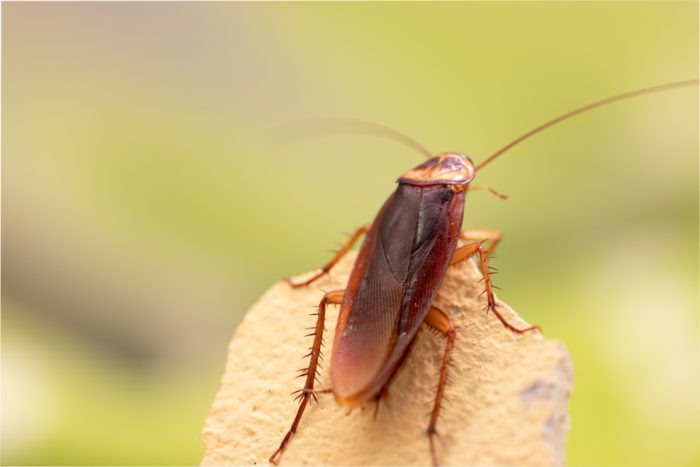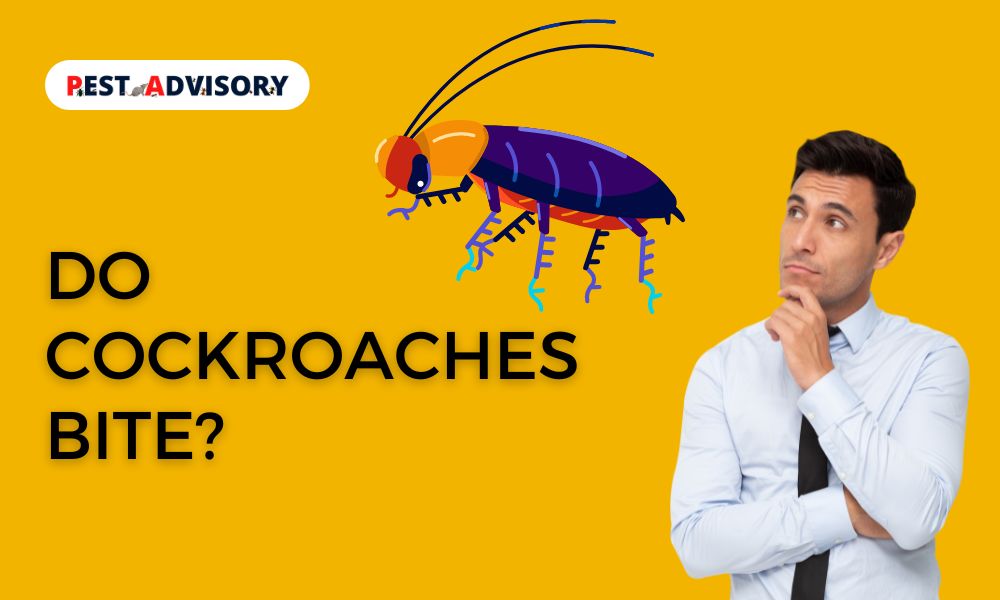Was that a cockroach scurrying across the floor?
And do you feel your arm itching now?
Well, it was brown. It had antennas and tiny legs. It did look like that familiar pest you know all too well.
Important Note: If you're tired of pests and want a reliable solution, then you should definitely consider seeking help from a professional pest control company. DIY solutions can be effective, but if you're dealing with a significant pest infestation, you don't want to rely solely on DIY methods. Pest control companies typically don't charge huge fees. You can fill out this form to receive free quotes from the top local pest control companies, and compare the quotes and see for yourself. Then, finally, your pest problems will be eliminated for good.
But did it just BITE you?
Did the previously innocent-looking cockroach- synonymous with dirt and filth and eating almost anything it came across, really just attack you?
Surely cockroaches don’t bite, right?
Does their large diet of vegetables, meat, and glue ever include humans?
Let’s find out.
Do Cockroaches Bite?
The short answer is YES.
But thankfully, the chances are very rare, and there are hardly any documented cases of roaches biting humans.
So, while cockroaches can technically bite humans, they don’t have pincers or teeth strong enough to break your skin.
Even the biggest species of cockroach, Blaberus Gigantes (the Giant Cave Roach), which grows up to a gigantic 3.5 inches, has never been known to bite.
BUT. Trigger warning.
There have been a few cases in history where roaches have turned to human hair, fingernails, eyelashes, and even dead skin when the availability of food was scarce.
Thankfully, the majority of the time, when it comes to feeding on humans, cockroaches only feast on the deceased.
Did you know when food is scarce, cockroaches will turn cannibal and eat the weaker members?
So, it isn’t technically impossible for them to turn violent when they are ravenous.
Population-wise, German cockroaches are the most likely to bite, considering their widespread distribution and infamous habit of causing large infestations.
And statistically speaking, this is the species you should consider avoiding if you are scared of being bitten.
When Can Cockroaches Bite?
Cockroaches usually bite sleeping humans, but ONLY accidentally.
Sometimes, they sense a small amount of food on the mouth or fingers of a person and deposit a weak bite while feasting on the crumbs.
The other possibility is when a cockroach crawls over a sleeping person to feast on the moisture built up around the eyes or the nose.
If you see redness or swelling and suspect an insect bite, chances are it wasn’t a cockroach. And while cockroaches can feed on hair and nails, it is an extremely unlikely circumstance.
Why Do Cockroaches Bite Humans?
Unlike other insects like fleas and mosquitoes that bite humans in self-defense or suck blood for nourishment, roaches don’t rely on humans to complete their life cycle. Their surroundings provide ample alternatives to satiate their hunger with.
As a consequence, they hardly ever bite humans for feeding.
Cockroach bites only occur when the populations outgrow the normal food sources, forcing these crawling insects to seek other means of food.
As the possibility of such a dire shortage is fairly improbable, humans are safe from becoming cockroach dinners (at least for the time being.)
Where Does A Cockroach Bite?
Cockroaches attack the following locations on the human body:
- Face
- Mouth
- Hands
- Fingers

How To Identify A Cockroach Bite?
Cockroach bites can sometimes be mistaken for bed bug bites, considering both predators are nocturnal and often operate simultaneously.
However, there are a few subtle differences that can help identify a roach bite and act accordingly:
Catching the crawling insect in the act
If you spot a roach scurrying away right after you feel a minor prick on your skin, it indicates trouble. However, this is not always feasible as roaches are nocturnal and mostly tend to bite during the wee hours of the night when you are asleep.
Cockroach bites
Cockroach Bites are quite similar to bed bug bites in their appearance and form.
They usually resemble bright red welts and swell to about 1-4mm wide – slightly larger than bed bug bites.
However, compared to bed bug bites which are usually found in groups in a straight line, cockroach bites only appear one at a time.
Like most insect bites, cockroach bites cause the skin to react by swelling up and becoming itchy, often becoming inflamed and irritated with time.
How Dangerous are Cockroach Bites?
Cockroaches are gross, unhygienic pests. It is not uncommon for them to travel over filth and garbage, collecting several pathogens on their bodies as a result.
They are NOT vectors for any type of disease that is known to cause serious health effects in humans. However, like any arthropod, even harmless insects can carry various types of bacteria on their mouthparts.
While their feces, urine, vomit, and sometimes saliva can spread diseases like Salmonella, Typhoid, and Cholera, their bites can cause the following effects:
- Skin rash
- Itchy skin
- Inflammation
How to Treat a Cockroach Bite?
A cockroach bite, although rare, can still cause significant damage. Therefore, it is advisable to closely monitor a bite and administer suitable treatment at the earliest.
- Wash the area of the bite with soap and water to eliminate any germs and reduce the risk of infection.
- Place a cold compress or ice pack on the bitten area to reduce any pain and swelling.
Can You Prevent Cockroach Bites?
While there is no way to stay vigilant against a cockroach attack around the clock, it is always best to prevent an infestation in the first place.
- Regularly check your home structure for gaps, cracks, and crevices, which often act as a safe breeding ground for roaches.
- Cleaning pipes regularly and replacing plumbing to avoid a cockroach infestation.
- Water spills and leaks from pipes, washing or watering activities, or poor lifestyle habits can also encourage cockroach breeding.
Final Words
Cockroaches have been a reason for menace for many localities for a long time. The most prominent cause of cockroach infestation is lack of hygiene.
Cockroaches are mostly attracted to filth and food materials that are kept over days together. The endpoint of the cockroach infestation is cleanliness and perfect maintenance of sanitation.
Many people have wondered whether cockroaches can sting or bite or not. The answer is yes. But this happens very rarely.
If you do end up getting bitten by one, you can follow the steps given above for instant relief.
So don’t worry about getting bitten. The chances are extremely low and usually unheard of. In normal circumstances, cockroaches are such timid creatures who will not dare come near humans while awake or asleep.

